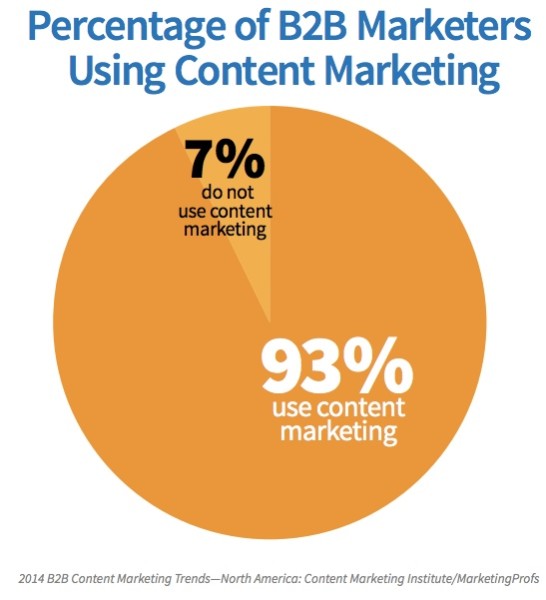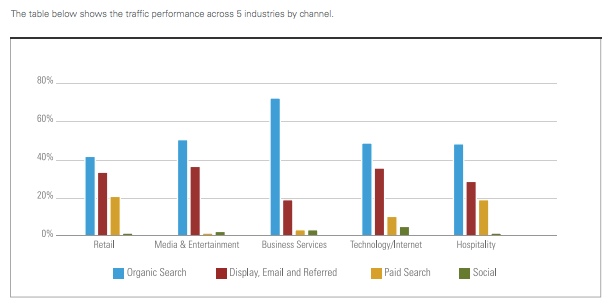B2B Marketers: Why Organic Content Is Your Weapon Of Choice
Back in 2013, Google informed us that B2B buyers don’t contact suppliers directly until 57 percent of the purchase process was complete. That purchase process starts with search and continues with content. Fast-forward to 2014: B2Bs are embracing content as a primary form of marketing, and they’re seeing stellar results from the organic search channel. […]

Back in 2013, Google informed us that B2B buyers don’t contact suppliers directly until 57 percent of the purchase process was complete. That purchase process starts with search and continues with content.
Fast-forward to 2014: B2Bs are embracing content as a primary form of marketing, and they’re seeing stellar results from the organic search channel.
In this post, we’ll take a look at what B2Bs said at the head of the year about their content marketing, and what results B2Bs are seeing in Q3 with new research showing organic content is the B2B marketer’s greatest ally. Then, we’ll touch on how to prepare for what’s to come with content.
B2Bs Led With Content In 2014
Heading into 2014, 93 percent of B2B brands said they were involved in content marketing, according to Content Marketing Institute’s (CMI) 2014 B2B Content Marketing report.

Of those B2Bs surveyed, 81 percent cited articles on their websites as the content marketing tactic of choice, while 76 percent cited blogs.

What do these tactics have in common? They’re all part of a brand’s organic search strategy, and they can all be optimized to boost results, and reach customers at the right moment with the right solution.
Many B2Bs already know this, which is why 79 percent said blogs were the most effective tactic, and 58 percent cited articles on their website were, according to the CMI survey.
Web traffic was the top metric that B2B marketers used to measure their content’s performance, the report said.

And it’s easy to see why. New research coming from BrightEdge in August shows organic search is the top driver of traffic and results for B2Bs, hands down.
B2Bs Are Gaining Traffic & Revenue With Content In Q3
Creating quality content for your website is one of the most effective ventures in your B2B content strategy to capture prospects at multiple stages within the conversion funnel.
According to BrightEdge data, the majority of traffic to B2B websites studied came from organic search, above and beyond the traffic coming from other channels such as paid search and social.
And the business services sector saw more benefit from the organic search channel than other industries studied like retail, hospitality and more. That demonstrates the B2B’s commitment to content as a tool for marketing.

Only 39 percent of B2Bs surveyed in the CMI report expected content to lead to direct sales, yet BrightEdge research shows content in the organic search channel is driving real revenue.
For B2Bs, the organic search revenue share was much higher than other sectors and proved to be more fruitful than other channels studied like paid search, display, email and social.

When you consider that the organic search channel has no direct costs for participation, and one must only factor in resources associated with creating and managing content, these stats become even more impressive.
How B2Bs Can Prepare For Content In 2015
We’re still in Q3, but many of us are already thinking and planning for what 2015 will bring. For B2Bs, content will continue to be a prime marketing weapon, and the organic search channel will remain a primary way to reach your target customer.
As Google cited in that post on the B2B digital evolution, those in the business services sector still face challenges:
It’s Marketing’s job to influence the 57 percent of the sale that occurs mostly on the web, before Sales contact, but three challenges – incomplete digital integration, ineffective content, and a poorly-optimized channel mix – are keeping marketers from growing mindshare and making the most of what they are getting already.
Organic content has the ability to be an effective aspect of your content marketing program, but you need several key components. Quality content, yes, but it needs to be fueled by strategy and data, and optimized so that your target audience finds it at the moment they need it (this is what Google calls the Zero Moment of Truth).
This post on how to succeed with content marketing in organic search details a roadmap on how to marry data and optimization to get the most from content for organic search.
And this recent post at Search Engine Land highlights what some of the top brands and search engines are saying about how to stay ahead in the coming year with content and SEO, which can go beyond just the traditional optimization methods we’re used to hearing about.
In sum, content for the organic search channel has staying power. It can build authority for your brand, and help B2Bs remain a relevant part of the customer’s purchase journey, which often starts with search.
As the research shows, B2Bs are embracing content for organic search, and seeing great results. What comes next is refining those strategies, and optimizing the content plan for maximum results in the coming year.
Contributing authors are invited to create content for MarTech and are chosen for their expertise and contribution to the search community. Our contributors work under the oversight of the editorial staff and contributions are checked for quality and relevance to our readers. MarTech is owned by Semrush. Contributor was not asked to make any direct or indirect mentions of Semrush. The opinions they express are their own.
Related stories